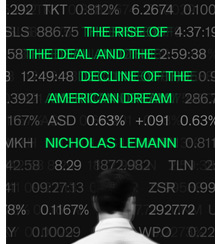Pressure points
In his new book, Transaction Man, journalist Nicholas Lemann describes the evolution — and failure — of competing attempts to manage the power of corporations.
Transaction Man: The Rise of the Deal and the Decline of the American Dream
by Nicholas Lemann, Farrar, Straus and Giroux, 2019
In August, the Business Roundtable, a group representing the largest U.S. corporations, updated its mission statement. For more than 20 years, the powerful business lobby had argued that companies exist primarily to deliver value to their shareholders. Now, in keeping with the zeitgeist, it argues that firms have a broader set of responsibilities to a range of interested parties: customers, employees, suppliers, the communities in which the firms are based, and then, finally, to their owners. The announcement was seen by many as an acknowledgement that the current model of U.S. capitalism is broken.
Nicholas Lemann, a staff writer for the New Yorker, comes to the same conclusion in his new book, Transaction Man. In this ambitious but concise study, he argues that over the past century, responsibility for Americans’ economic well-being has been shunted from unaccountable monolithic corporations to financial markets and back again, with the government unable — or, more often, unwilling — to intervene. The disconnect between the choices of America’s business and political elite and their effects on those far from the centers of power, Lemann believes, has resulted in rising inequality, political disenfranchisement, and a decline in faith in “the core institutions of American life.”
Transaction Man, which blends economic history, biography, and shoe-leather reportage, begins in the early 20th century. A group of men, including J.P. Morgan, John D. Rockefeller, and Andrew Carnegie, had built fantastically successful companies that dominated major industries such as banking, oil, and steel. The founders themselves were coming to the end of their lives, but their businesses were strengthening and were, as Lemann writes, “accountable to nobody.” He argues that the absence of oversight of these firms was such that “for two or three generations, what to do about big business was the central question of American life.” It consumed Adolf Berle, a third-generation German immigrant possessed of “a superpowered personal force and drive,” who eventually became an architect of Franklin D. Roosevelt’s New Deal.
Berle was one of many public intellectuals who wanted to restrain the power of corporations. Rather than forcibly breaking them up as the early 20th-century trustbusters wanted, he supported an expansion of the supervisory powers of the federal government. Indeed, the New Deal imposed an array of standards and regulations that inhibited the power of very large corporations. In 1950, the Treaty of Detroit, a landmark agreement between General Motors and the United Auto Workers that offered regular cost-of-living pay increases, health insurance, and retirement pensions, evened the playing field between capital and labor. It was soon replicated throughout various industries around the country. The belief was that institutions — government, labor unions, and shareholders acting through boards of directors — would restrain companies. As the economy grew in a more or less equitable fashion in the 1950s and 1960s, liberals moved on to other concerns, including civil rights, the environment, and feminism.
But the stage was being set for a market-oriented reaction that has raged from the 1970s to the present. Labor unions weakened amid globalization, and shares of companies came to be held by large institutional funds that were concerned more with growth than with equity. At the same time, a group of counter-cultural economists based at the University of Chicago began to challenge the wisdom of regulation and elevated the efficient power of markets as a stronger influence over company behavior than governments.
The story of how unfettered capitalism brought the world economy to the brink in 2008 is well-trodden territory. Yet Lemann still manages to summon feelings of exhilaration as the finance industry broke its shackles, as well as those of revulsion at the predatory tactics of mortgage brokers. He is a scrupulously fair judge, generous enough to suggest that “freeing markets from constraint…was the best way for government to fulfill its most basic mission.” However, his gut-wrenching reportage from a Chicago neighborhood on how politicians failed to help foreclosed homeowners confirms that excessive deregulation was a mistake with incalculable consequences.
Lemann, a former dean of the Columbia Journalism School, is an accomplished narrative writer. His broad argument is fortified with asides, including an entertaining history of Morgan Stanley’s transformation from a genteel Manhattan institution to a global behemoth, and a quietly devastating section on the plight of independent auto dealers when the financial crisis struck.
Lemann’s gut-wrenching reportage from a Chicago neighborhood on how politicians failed to help foreclosed homeowners confirms that excessive deregulation was a mistake with incalculable consequences.
So what should be the governing principle going forward if we are to restore the balance between the interests of individuals and those of large corporations? Lemann identifies a third age, following those of the institution and the market, which he calls the age of the network. He admits that this age is problematic, both for the economy and for his argument. Networks, especially those dreamed up in Silicon Valley, have promised “innovation, mass empowerment, cultural tolerance, and the overturning of existing arrangements.” But instead of a new kind of freedom, the network era has created a group of “fairly conventional large corporations” in Alphabet, Amazon, Apple, Facebook, and Microsoft, some of whose actions are reminiscent of those of Gilded Age giants.
Skeptical that sweeping ideologies will ever provide economic prosperity for the masses while constraining the excesses of companies, Lemann prefers a more dynamic, complex model in which competing interest groups battle to exert pressure on institutions and set the mood of the day. Such collectives, Lemann argues, ultimately brought about the abolition of slavery, as well civil rights for all. That may sound like wishful thinking. But it is possible to feel the hot breath of interest groups on the necks of the members of the Business Roundtable. After a generation of retrenchment, the responsibilities of America’s corporations could be set to expand again.
Author profile:
- Mike Jakeman is a freelance journalist and has previously worked for PwC and the Economist Intelligence Unit.






